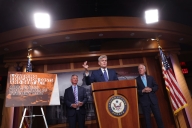You have /5 articles left.
Sign up for a free account or log in.
The U.S. Department of Commerce on Tuesday announced a new effort aimed at working with universities to protect potentially sensitive research products from theft by foreign agents.
The so-called Academic Outreach Initiative was announced by the Commerce Department’s assistant secretary for export enforcement, Matthew S. Axelrod, in a speech at the annual meeting of the National Association of College and University Attorneys.
“The challenges of keeping our academic research environments thriving and our controlled information secure from improper foreign acquisition are significant,” Axelrod said in remarks prepared for delivery at the conference. “That’s why I’m announcing today a new Export Enforcement initiative to help academic research institutions protect themselves from these threats.”
By working more closely with universities that conduct research with potential national security implications, the federal government “will empower colleges and universities to prevent unauthorized exports, including releases of controlled technology, and to make informed judgments about their future and ongoing partnerships with foreign universities and companies,” Axelrod said in remarks prepared for delivery at the conference.
The initiative has four major elements:
- Identifying the universities and research institutions perceived to be at the highest risk because they conduct research for the Department of Defense, have ties to restricted foreign universities or conduct research in sensitive technologies;
- Assigning “outreach agents” for those institutions to help them prevent unauthorized export of sensitive information;
- Offering briefings to American universities” foreign research partners to inform them of potential risks from working with risky entities; and
- Providing training to prioritized research institutions on potential threats.
A Government Accountability Office report this month said the agencies charged with preventing the export of information about sensitive technologies would benefit from better information about which universities face the most risk of exposure.





